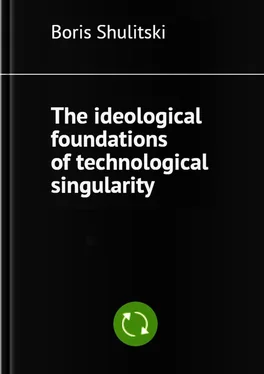The objective basis for the interaction of the general scientific picture of the world and special scientific knowledge is their common object of study – the external world. The general scientific view of the world summarizes and systematizes knowledge about the world received from other sciences, while it itself rises to a higher level and gives the ideological generalization of the results and general methods of further research, which, in turn, allows the special sciences, on condition of new empirical data accumulation, to use this general scientific level of knowledge as a matrix for scientific research in the process of restructuring its own logical foundations during its intensive development. This ensures the emergence of new fundamental theories, in connection with which natural science enters the next phase of its historical movement.
But at the same time, factual material also appears for generalization within the framework of the general scientific picture of the world. It summarizes the achievements of science of a higher development level, clarifies the previous methodological principles and, in an updated form, brings them back to the natural sciences. Along with the heuristic role of the general scientific picture of the world in relation to the processes of formation of new theoretical ideas and hypotheses (as a matrix of scientific research), another important methodological function should be mentioned, namely, the ideological one – as a matrix for building a coherent system, uniting the fragmented mosaic knowledge and forming a value system orientation of the researcher. According to academician A.D. Aleksandrov, “… the statement about the uselessness of dialectics, philosophy, etc., is nothing more than the self-satisfied lack of culture, shown by the undeveloped"hard worker"shows, who boasts of the fact that all these theories are not needed.” Outstanding researchers Louis de Broglie, M. Planck, A. Einstein, I. Pavlov, the founder of cybernetics N. Wiener and many others adhered to a similar point of view. Philosophical principles have great methodological significance and provide an opportunity to intensively develop the special sciences.
At the beginning of the third millennium, it became possible to correct the general scientific picture of the world based on information obtained in the field of special sciences. This process is a multi-stage one; it includes a number of well-known stages of scientific knowledge of the new content, including hypothetical views of the world. The constructive elements of the hypothetical energoinformational view of the world suggested in the book are the concepts of “ energy ” and “ information ”, and the dialectical methodology has been adopted as the main method of analysis. Only from the standpoint of dialectics can one understand the complex, full of contradictions, path of the objective truth formation, connection of the elements of absolute and relative, stable and changeable at each stage of the science development, transitions from one form of generalization to another, deeper forms of cognition of the surrounding world. Chapter I considered the general provisions of the dialectical methodology. The suggested hypothetical view of the world allows the separate areas of scientific knowledge to be integrated into a single system, adequately explaining the actual vital processes of the surrounding world in their integrity, dynamism and inseparable interconnection, as well as heuristically prognosticate the evolutionary processes development. Chapter II considers the possible structure of the surrounding world in the framework of the energy-information concept of the world from the standpoint of universal cosmocentrism.
The universal concept of the dialectic theory is the principle of development. According to the generally accepted definition, development refers to “ the endless process of regular self-renewal, self-organization of matter and the generation of qualitatively new, including the rational forms of its being and movement ”. It is appropriate to raise the question: if development is an endless process of generating qualitatively new forms, then can be organic life and homo sapiens, as its highest form, the final, finite stage of the evolution of being in itsrational forms of being, as well as the movement of matter? Or is it still transitional, suggesting the possibility of the further generation of qualitatively new, more highly organized rational forms of matter, continuing the endless regular process of its self-renewal and selforganization ? The answer to this question, perhaps, will determine the development of philosophical thought of the third millennium and will lead to the division of thinkers into two camps – anthropocentrists and cosmocentrists.
The analysis of scientific information of the beginning of the third millennium is evidence in favor of the cosmocentric approach and makes possible to reveal the undeniable signs of continuing the process of qualitatively added complexity of the thinking matter organization forms, and its endless regular self-renewal . The conceptual and informational basis for this is new scientific disciplines born in the 20th century. First of all, cybernetics , which showed the unity of control and communication in the animal and the machine. As a consequence, the fundamental possibilities of inorganic devices self-organization can be the considered, which effectively reproduce rational anti-entropic productive activity of man in the course of transforming and structuring the surrounding world.
Another scientific discipline is psychoanalysis , which discovered the energetic sources of human mental activity. “ If it were not for Freud, – said N. Wiener, the founder of cybernetics, – there would be no cybernetics ”. The very fact of the existence of dialectic patterns of human functioning, the dialectic of homo sapiens , follows naturally from the universality of the dialectical method of cognition and the inseparable interconnection between the surrounding world and man as an element of one of the related and interdependent structural levels in its hierarchical organization. Chapter III is devoted to the analysis of the dialectic patterns of human functioning and the principle of universal cosmocentrism arising from them.
As it was already mentioned, the correspondence betweenthe constructed hypothetical worldview and the real one should be tested based on feedback concerning its ability to serve as a scientific search matrix for special scientific disciplines in terms of searching for the fundamentally new phenomena, processes and practical technologies. Chapter IV considers examples of the constructive use of a hypothetical energoinformational worldview as a matrix for scientific search.
First, in the applied aspect, the energoinformational worldview requested as the ideological basis of the AppliedInternetics, which is the new direction of science that studies the properties, patterns and ways of using the global Internet in various spheres of human activity. At a certain stage in the network information formations development, it is completely unexpected for homo sapiens (but predictably and regularly in a dialectical evolutionary scenario) a spontaneous jump-like transformation of IT systems into a fundamentally new quality may occur. The prospects are fantastic, but from the point of view of the energoinformational picture of the world, they are inevitable in the scenario of the dialectical evolution of the surrounding world. How to carry out (and whether it is necessary to carry out?) practical counteraction to the development of such a scenario?
Another significant applied moment is the fact that within the framework of the new view of the world there is a categorical apparatus for analyzing fundamentally new formations of actual reality that can change our daily life in the near future, that is, informational-productive"smart dust” Internet complexes ( smart-dust formations). Prototypes of the latter are already being produced by research laboratories. Essentially, we have to deal with mobile local Internet complexes “scattered” in a certain space, unregistered by organs of human senses, but capable of intelligent dynamic interaction with the environment (including human one), and in the future, aimed at targeted transformation of this environment. How to classify such objects of the IT -industry in the context of traditional orthodox ideological views?
Читать дальше










